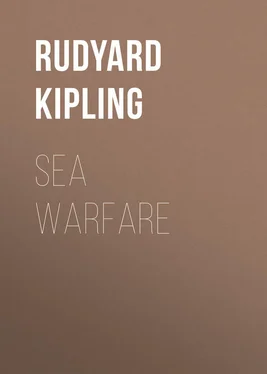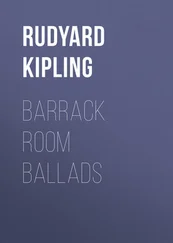Rudyard Kipling - Sea Warfare
Здесь есть возможность читать онлайн «Rudyard Kipling - Sea Warfare» — ознакомительный отрывок электронной книги совершенно бесплатно, а после прочтения отрывка купить полную версию. В некоторых случаях можно слушать аудио, скачать через торрент в формате fb2 и присутствует краткое содержание. Жанр: literature_20, Поэзия, foreign_antique, foreign_prose, на английском языке. Описание произведения, (предисловие) а так же отзывы посетителей доступны на портале библиотеки ЛибКат.
- Название:Sea Warfare
- Автор:
- Жанр:
- Год:неизвестен
- ISBN:нет данных
- Рейтинг книги:4 / 5. Голосов: 1
-
Избранное:Добавить в избранное
- Отзывы:
-
Ваша оценка:
- 80
- 1
- 2
- 3
- 4
- 5
Sea Warfare: краткое содержание, описание и аннотация
Предлагаем к чтению аннотацию, описание, краткое содержание или предисловие (зависит от того, что написал сам автор книги «Sea Warfare»). Если вы не нашли необходимую информацию о книге — напишите в комментариях, мы постараемся отыскать её.
Sea Warfare — читать онлайн ознакомительный отрывок
Ниже представлен текст книги, разбитый по страницам. Система сохранения места последней прочитанной страницы, позволяет с удобством читать онлайн бесплатно книгу «Sea Warfare», без необходимости каждый раз заново искать на чём Вы остановились. Поставьте закладку, и сможете в любой момент перейти на страницу, на которой закончили чтение.
Интервал:
Закладка:
The child in the Pullman-car uniform just going ashore is a wireless operator, aged nineteen. He is attached to a flagship at least 120 feet long, under an admiral aged twenty-five, who was, till the other day, third mate of a North Atlantic tramp, but who now leads a squadron of six trawlers to hunt submarines. The principle is simple enough. Its application depends on circumstances and surroundings. One class of German submarines meant for murder off the coasts may use a winding and rabbit-like track between shoals where the choice of water is limited. Their career is rarely long, but, while it lasts, moderately exciting. Others, told off for deep-sea assassinations, are attended to quite quietly and without any excitement at all. Others, again, work the inside of the North Sea, making no distinction between neutrals and Allied ships. These carry guns, and since their work keeps them a good deal on the surface, the Trawler Fleet, as we know, engages them there – the submarine firing, sinking, and rising again in unexpected quarters; the trawler firing, dodging, and trying to ram. The trawlers are strongly built, and can stand a great deal of punishment. Yet again, other German submarines hang about the skirts of fishing-fleets and fire into the brown of them. When the war was young this gave splendidly "frightful" results, but for some reason or other the game is not as popular as it used to be.
Lastly, there are German submarines who perish by ways so curious and inexplicable that one could almost credit the whispered idea (it must come from the Scotch skippers) that the ghosts of the women they drowned pilot them to destruction. But what form these shadows take – whether of "The Lusitania Ladies," or humbler stewardesses and hospital nurses – and what lights or sounds the thing fancies it sees or hears before it is blotted out, no man will ever know. The main fact is that the work is being done. Whether it was necessary or politic to re-awaken by violence every sporting instinct of a sea-going people is a question which the enemy may have to consider later on.
Dawn off the Foreland – the young flood making
Jumbled and short and steep —
Black in the hollows and bright where it's breaking —
Awkward water to sweep.
"Mines reported in the fairway,
"Warn all traffic and detain.
"'Sent up Unity, Claribel, Assyrian,
Stormcock, and Golden Gain."
Noon off the Foreland – the first ebb making
Lumpy and strong in the bight.
Boom after boom, and the golf-hut shaking
And the jackdaws wild with fright!
"Mines located in the fairway,
"Boats now working up the chain,
"Sweepers – Unity, Claribel, Assyrian,
Stormcock and Golden Gain."
Dusk off the Foreland – the last light going
And the traffic crowding through,
And five damned trawlers with their syreens blowing
Heading the whole review!
"Sweep completed in the fairway.
"No more mines remain.
"'Sent back Unity, Claribel, Assyrian,
Stormcock, and Golden Gain."
The Trawlers seem to look on mines as more or less fairplay. But with the torpedo it is otherwise. A Yarmouth man lay on his hatch, his gear neatly stowed away below, and told me that another Yarmouth boat had "gone up," with all hands except one. "'Twas a submarine. Not a mine," said he. "They never gave our boys no chance. Na! She was a Yarmouth boat – we knew 'em all. They never gave the boys no chance." He was a submarine hunter, and he illustrated by means of matches placed at various angles how the blindfold business is conducted. "And then," he ended, "there's always what he'll do. You've got to think that out for yourself – while you're working above him – same as if 'twas fish." I should not care to be hunted for the life in shallow waters by a man who knows every bank and pothole of them, even if I had not killed his friends the week before. Being nearly all fishermen they discuss their work in terms of fish, and put in their leisure fishing overside, when they sometimes pull up ghastly souvenirs. But they all want guns. Those who have three-pounders clamour for sixes; sixes for twelves; and the twelve-pound aristocracy dream of four-inchers on anti-aircraft mountings for the benefit of roving Zeppelins. They will all get them in time, and I fancy it will be long ere they give them up. One West Country mate announced that "a gun is a handy thing to have aboard – always." "But in peacetime?" I said. "Wouldn't it be in the way?"
"We'm used to 'em now," was the smiling answer. "Niver go to sea again without a gun — I wouldn't – if I had my way. It keeps all hands pleased-like."
They talk about men in the Army who will never willingly go back to civil life. What of the fishermen who have tasted something sharper than salt water – and what of the young third and fourth mates who have held independent commands for nine months past? One of them said to me quite irrelevantly: "I used to be the animal that got up the trunks for the women on baggage-days in the old Bodiam Castle," and he mimicked their requests for "the large brown box," or "the black dress basket," as a freed soul might scoff at his old life in the flesh.
My sponsor and chaperon in this Elizabethan world of eighteenth-century seamen was an A.B. who had gone down in the Landrail , assisted at the Heligoland fight, seen the Blücher sink and the bombs dropped on our boats when we tried to save the drowning ("Whereby," as he said, "those Germans died gottstrafin' their own country because we didn't wait to be strafed"), and has now found more peaceful days in an Office ashore. He led me across many decks from craft to craft to study the various appliances that they specialise in. Almost our last was what a North Country trawler called a "common sweeper," that is to say, a mine-sweeper. She was at tea in her shirt-sleeves, and she protested loudly that there was "nothing in sweeping." "'See that wire rope?" she said. "Well, it leads through that lead to the ship which you're sweepin' with . She makes her end fast and you make yourn. Then you sweep together at whichever depth you've agreed upon between you, by means of that arrangement there which regulates the depth. They give you a glass sort o' thing for keepin' your distance from the other ship, but that's not wanted if you know each other. Well, then, you sweep, as the sayin' is. There's nothin' in it. You sweep till this wire rope fouls the bloomin' mines. Then you go on till they appear on the surface, so to say, and then you explodes them by means of shootin' at 'em with that rifle in the galley there. There's nothin' in sweepin' more than that."
"And if you hit a mine?" I asked.
"You go up – but you hadn't ought to hit em', if you're careful. The thing is to get hold of the first mine all right, and then you go on to the next, and so on, in a way o' speakin'."
"And you can fish, too, 'tween times," said a voice from the next boat. A man leaned over and returned a borrowed mug. They talked about fishing – notably that once they caught some red mullet, which the "common sweeper" and his neighbour both agreed was "not natural in those waters." As for mere sweeping, it bored them profoundly to talk about it. I only learned later as part of the natural history of mines, that if you rake the tri-nitro-toluol by hand out of a German mine you develop eruptions and skin-poisoning. But on the authority of two experts, there is nothing in sweeping. Nothing whatever!
Now imagine, not a pistol-shot from these crowded quays, a little Office hung round with charts that are pencilled and noted over various shoals and soundings. There is a movable list of the boats at work, with quaint and domestic names. Outside the window lies the packed harbour – outside that again the line of traffic up and down – a stately cinema-show of six ships to the hour. For the moment the film sticks. A boat – probably a "common sweeper" – reports an obstruction in a traffic lane a few miles away. She has found and exploded one mine. The Office heard the dull boom of it before the wireless report came in. In all likelihood there is a nest of them there. It is possible that a submarine may have got in last night between certain shoals and laid them out. The shoals are being shepherded in case she is hidden anywhere, but the boundaries of the newly discovered mine-area must be fixed and the traffic deviated. There is a tramp outside with tugs in attendance. She has hit something and is leaking badly. Where shall she go? The Office gives her her destination – the harbour is too full for her to settle down here. She swings off between the faithful tugs. Down coast some one asks by wireless if they shall hold up their traffic. It is exactly like a signaller "offering" a train to the next block. "Yes," the Office replies. "Wait a while. If it's what we think, there will be a little delay. If it isn't what we think, there will be a little longer delay." Meantime, sweepers are nosing round the suspected area – "looking for cuckoos' eggs," as a voice suggests; and a patrol-boat lathers her way down coast to catch and stop anything that may be on the move, for skippers are sometimes rather careless. Words begin to drop out of the air into the chart-hung Office. "Six and a half cables south, fifteen east" of something or other. "Mark it well, and tell them to work up from there," is the order. "Another mine exploded!" "Yes, and we heard that too," says the Office. "What about the submarine?" " Elizabeth Huggins reports…"
Читать дальшеИнтервал:
Закладка:
Похожие книги на «Sea Warfare»
Представляем Вашему вниманию похожие книги на «Sea Warfare» списком для выбора. Мы отобрали схожую по названию и смыслу литературу в надежде предоставить читателям больше вариантов отыскать новые, интересные, ещё непрочитанные произведения.
Обсуждение, отзывы о книге «Sea Warfare» и просто собственные мнения читателей. Оставьте ваши комментарии, напишите, что Вы думаете о произведении, его смысле или главных героях. Укажите что конкретно понравилось, а что нет, и почему Вы так считаете.












